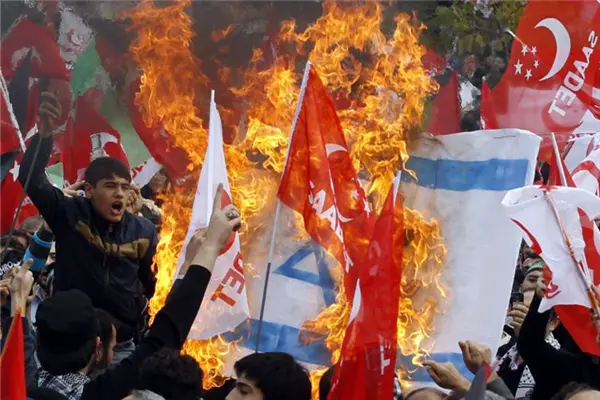Islamic Hamas movement, which has been ruling the Gaza Strip since 2007, was apparently unhappy after Israel and Turkey reached a reconciliation agreement earlier this week that won't completely lift an Israeli blockade.
According to the agreement, Israel promised Turkey that it would relax Gaza blockade, but will keep it imposed on the ground and sea in order to prevent Hamas from smuggling more arms from abroad. Turkey would build a power station, water desalination station and a hospital in Gaza.
Relations between Israel and Turkey soured following a deadly 2010 raid by an Israeli naval ship against a Turkish ship, the Mavi Marmara.
The Mavi Marmara was part of a flotilla headed to the Palestinian enclave of the Gaza Strip demanding the lifting of the Israeli blockade. The incident killed 9 Turkish nationals.
According to the agreement, Israel will fund 20 million U.S. dollars in compensation for the victims' families. The agreement will also enable Turkey to undertake infrastructure projects in Gaza.
As for Turkey, it relinquished its demand to remove the Israeli blockade on the Gaza Strip, and will bar judicial prosecution against Israeli soldiers and officers.
Turkey also committed to ban the Islamic militant Hamas movement from carrying out or planning attacks against Israel from its territory.
Turkey won't cut off its ties with Hamas, but it will limit the activities of Hamas leaders present in Ankara. However, observers and analysts said Hamas would not be happy because the Israeli blockade won't be fully lifted, but at the same time Hamas would consider easing the blockade an achievement.
After the agreement was announced and in order to keep good ties with Turkey, Hamas kept silent for several hours. Then it issued an official leaflet emailed to reporters saying that it highly appreciates the Turkish efforts to ease an Israeli blockade that has been imposed on the Gaza Strip for ten years.
Officials close to Hamas in Gaza said relaxing the Israeli blockade "is a good sign to improve the daily hard living situation of the Gaza Strip populations and it could be a good step forward to increase the Turkish efforts and pressure on Israel to completely end the Israeli blockade later on."
Meanwhile observers said that Hamas leaders were disappointed when Turkey announced that it had given up its demand of totally lifting the blockade, adding that the Turkish decision "was a setback to the aspirations of Hamas movement."
Mustafa Sawaf, a Gaza-based political analyst, told Xinhua that "even if the Israeli blockade is not fully lifted, Hamas movement would grab the opportunity and would wait for more steps that lead at the end to a full lifting of the Israeli blockade."
"The steps that would lead to relaxing the siege imposed on Gaza can't be considered as political achievement for Hamas, but it would be a fruit of its good ties with Turkey and its endless attempt to improve the hard living condition in the impoverished Gaza Strip," said Sawaf.
He stressed that Hamas highly trusts Turkey, adding "this confidence would not be affected even if the Turkish deal with Israel doesn't include a full ending of the siege imposed on Gaza, and the Turkish attempts to convince Israel to fully end the siege would continue and there is no blame on Hamas."
Senior Hamas delegation headed by Hamas chief Khaled Meshaal visited Turkey earlier this week and held talks with the Turkish leaders to understand more details related to the agreement reached with Israel.
Hamas said in an official statement emailed to reporters on Saturday that Hamas delegation reiterated to the Turkish leaders that the main goal for the Palestinians is to end the Israeli siege.
However, some analysts voiced disjointed views towards the deal between Turkey and Israel.
Mustafa Ibrahim, another Gaza-based political analyst, blamed Turkey for giving up its demand of a complete lifting of the blockade, adding "Turkey is only concerned about its interests and it needs Israel for its economy and security interests."
"It seems that the agreement reached between Israel and Turkey gives the latter a distinctive role in aiding Gaza, similar to the role of the United Nations organizations," said Ibrahim, adding "the agreement deals with Gaza as an area that needs humanitarian aid and has no political implications."
He went on saying that the Israeli blockade apparently will continue forever and it won't be completely lifted, adding "the Israeli siege imposed on the Gaza Strip is a political collective punishment to around two million Palestinians, but most of them are not involved in the whole plot."
Abdul Majid Sweilem, a political analyst based in the West Bank, told Xinhua that the Turkish-Israeli agreement would boost Hamas rule of the Gaza Strip and would deepen the internal Palestinian division, adding that the prices of the Turkish-Israeli reconciliation are more than just providing Humanitarian aid.
"Turkey searches for its economy and security interests and Turkey had replaced the aspirations of Hamas to completely end the blockade," said Sweilem, adding that "Hamas has no choice but to accept any Turkish achievement because Hamas hardly got support from Egypt and Saudi Arabia."
(APD)
 简体中文
简体中文

